Archeology
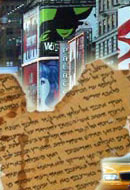 The Dead Sea Scrolls, Alive in Times Square
The Dead Sea Scrolls, Alive in Times SquareTuesday, November 8, 2011 by Alex Joffe | Jewish Ideas Daily » Daily Features
In the basement of a converted theater on West 44th Street, tucked between the legendary Sardi's restaurant and a bowling alley, a block from Times Square and across the street from the musical Memphis, is Discovery Times Square.
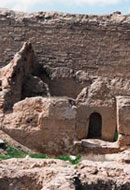 Diversity at Dura-Europos
Diversity at Dura-EuroposWednesday, October 12, 2011 by Alex Joffe | Jewish Ideas Daily » Daily Features
A new exhibit at New York University's Institute for the Study of the Ancient World brings to life the ancient city of Dura-Europos, which stands high above the Euphrates River on the eastern border of modern Syria, a monument to vanished eras.
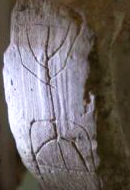 Mysteries of the Menorah
Mysteries of the MenorahThursday, September 8, 2011 by Meir Soloveichik | Jewish Ideas Daily » Daily Features
On the eve of Tisha b'Av, 2011, archeologists revealed artifacts newly unearthed from the great Jewish revolt against Rome (67–70 C.E.), including coins minted by the rebels and a stone incised with a sketch of the Temple menorah. But what is the menorah, and what does it symbolize?
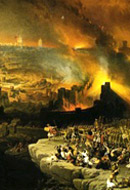 Mourning, Memory, and Art
Mourning, Memory, and ArtMonday, August 8, 2011 by Richard McBee | Jewish Ideas Daily » Daily Features
David Roberts (1796–1864) was a Scottish painter who in the late 1830's traveled extensively in the Levant and Egypt documenting "Orientalist" sites in drawings and watercolors. Among Roberts's paintings was a massive 1849 work, The Destruction of Jerusalem.
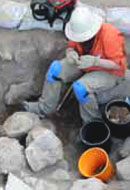 The New Biblical Archeology
The New Biblical ArcheologyMonday, July 25, 2011 by Alex Joffe | Jewish Ideas Daily » Daily Features
Every summer, the Israel Antiquities Authority holds a reception for foreign archeological teams excavating in Israel. This year's reception was attended by over 200 archeologists, who are investigating sites ranging in age from the Paleolithic through Islamic periods.
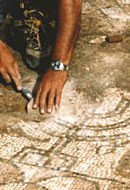 The Tourist’s Dilemma
The Tourist’s DilemmaMonday, June 20, 2011 by Alex Joffe | Jewish Ideas Daily » Daily Features
On the southwest coast of Albania on the Ionian Sea, opposite the Greek island of Corfu, beneath the modern town of Saranda, lies the ancient city of Onchesmos. That ancient city had a synagogue.
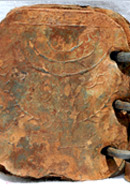 On Faith and Forgeries
On Faith and ForgeriesWednesday, May 4, 2011 by Alex Joffe | Jewish Ideas Daily » Daily Features
Remnants of the biblical world continue to surface like uncharted reefs along the shore, looming up and weirdly fascinating our nominally secular minds. One such set of objects, recently emerged, is a series of lead plates that appear to be embossed with writings and images and bound into books or "codices." What are they, how have they been received, and what does their reception tell us about our willingness to believe?
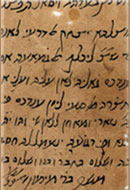 Sifting the Cairo Genizah
Sifting the Cairo GenizahFriday, April 1, 2011 by Lawrence Grossman | Jewish Ideas Daily » Daily Features
Everyone knows about the Dead Sea Scrolls, discovered over 60 years ago, and about the new light they shed on the sectarian Judaism of late antiquity, the beginnings of rabbinic Judaism, and possibly the prehistory of Christianity. Fifty years before that, the Cairo Genizah similarly revolutionized the picture of the Jewish Middle Ages.
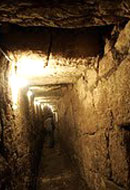 The Archeology War
The Archeology WarThursday, March 31, 2011 by Alex Joffe | Jewish Ideas Daily » Daily Features
The Islamic Educational, Scientific, and Cultural Organization (ISESCO) was founded in 1979 by the Organization of the Islamic Conference (OIC). It has three basic goals. The first is to spread a Saudi version of Koranic education throughout the Islamic world. The second is to publicize Islam to the non-Islamic world. The third goal is to oppose the "Judaization of Al-Quds"—i.e., Jerusalem.
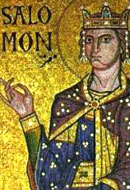 Seeking Solomon
Seeking SolomonTuesday, March 29, 2011 by Eve Levavi Feinstein | Jewish Ideas Daily » Daily Features
For traditionalists, the biography of King Solomon is enshrined in the Bible, in the narrative accounts in the books of Kings and Chronicles. The son of King David, who spent his career battling Israel's enemies, Solomon is depicted as ushering in an era of peace and prosperity. Yet the Bible also relates that Solomon took numerous foreign wives and concubines—one thousand in total—who led him to worship foreign gods and build shrines for their service.
Editors' Picks
Building Herod's Temple Leen Ritmeyer, Biblical Archeology Review. At both the southwest and southeast corners of the Temple Mount, stones weighing over 80 tons are still in place 100 feet above the foundations. How did they get there?
Searching for Sodom , Bible History Daily. Using biblical clues to search for ancient Sodom, archeologists excavated Tall el-Hammam in Jordan—and found evidence of a sudden and extreme conflagration over 3,000 years ago.
Masada’s Unscorched Earth Ehud Netzer, Biblical Archeology Review. Josephus records that Masada’s Jewish defenders set it ablaze before the Romans broke in. But the archeological evidence shows a more sophisticated, though futile, defense strategy.
The Truth About Crucifixion Hershel Shanks, Bible History Daily. New analysis of the only remains of a crucified man, discovered in Jerusalem, suggests that victims were not nailed to the cross but tied to it. Either way, death was by asphyxiation.
Whatever Happened to the Hittites? Trevor Bryce, Archaeology Odyssey. The Hittite Empire once stretched from the Aegean in the west to the Euphrates in the east. But when invaders finally destroyed its capital, Hattusa, they found the city deserted.
Rehabilitating Herod Jessica Steinberg, Times of Israel. "He’s notoriously known as the bad guy," says the curator of the Israel Museum's vast new exhibit on King Herod. "But this man was a riddle."
The Original Jews for Jesus Mark Edwards, Marginalia. It wasn’t unusual in Jesus’ time to find Jews claiming that they could heal long-distance and raise the dead. Why was it only Jesus who attained the status of a god?
Budget-Balancing, Roman-Style , Bible History Daily. The Emperor Vespasian took office amid a fiscal deficit. But plunder from the Jewish Revolt not only filled the budget hole but financed the construction of the Colosseum.
Finding Books Within Books Yitz Landes, Talmud Blog. Ancient Hebrew fragments that were used as bindings for Latin manuscripts are being rescued across Europe. But they are not a European Genizah.
Variations on a Theme Geza Vermes, Standpoint. Discrepancies among the Dead Sea Scrolls, the Samaritan Pentateuch, the Septuagint, and the Masoretic biblical text point to interpretative ferment in the time of Jesus.

